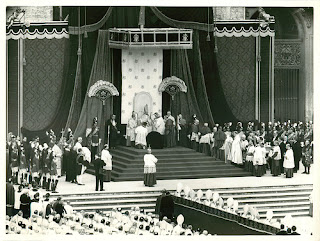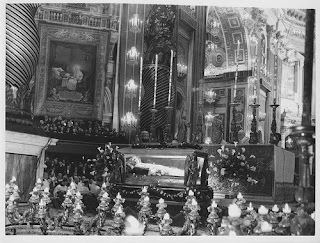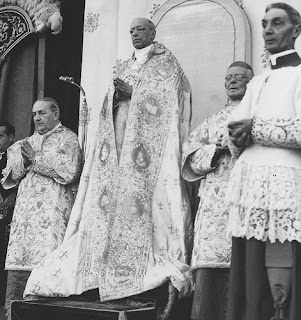Michaelmas, the feast of Saint Michael
the Archangel (also the Feast of Saints Michael, Gabriel, Uriel and Raphael, the
Feast of the Archangels, or the Feast of Saint Michael and All Angels) is today.
Saint Michael is one of the principal angels; his name was the war-cry of the good angels in the battle fought in heaven against the enemy and his followers. Four times his name is recorded in Scripture:
(1) Daniel 10: 13 sqq., Gabriel says to Daniel, when he asks God to permit the Jews to return to Jerusalem: "The Angel [D.V. prince] of the kingdom of the Persians resisted me . . . and, behold Michael, one of the chief princes, came to help me . . . and none is my helper in all these things, but Michael your prince."
(2) Daniel 12, the Angel speaking of the end of the world and the Antichrist says: "At that time shall Michael rise up, the great prince, who standeth for the children of thy people."
(3) In the Catholic Epistle of Saint Jude: "When Michael the Archangel, disputing with the devil, contended about the body of Moses", etc. Saint Jude alludes to an ancient Jewish tradition of a dispute between Michael and Satan over the body of Moses, an account of which is also found in the apocryphal book on the assumption of Moses (Origen, De Principiis III.2.2). Saint Michael concealed the tomb of Moses. Satan, however, by disclosing it, tried to seduce the Jewish people to the sin of hero-worship. Saint Michael also guards the body of Eve, according to the "Revelation of Moses" ("Apocryphal Gospels", etc, ed. A. Walker, Edinburgh, p. 647).
(4) Apocalypse 12: 7, "And there was a great battle in heaven, Michael and his angels fought with the dragon." Saint John speaks of the great conflict at the end of time, which reflects also the battle in heaven at the beginning of time. According to the Fathers there is often a question of Saint Michael in Scripture where his name is not mentioned. They say he was the cherub who stood at the gate of paradise, "to keep the way of the tree of life" (Genesis 3: 24), the angel through whom God published the Decalogue to his chosen people, the angel who stood in the way against Balaam (Numbers 22: 22 sqq.), the angel who routed the army of Sennacherib (2 Kings 19: 35).
Following these Scriptural passages, Christian tradition gives to Saint Michael four offices:
To fight against Satan.
To rescue the souls of the faithful from the power of the enemy, especially at the hour of death.
To be the champion of God's people, the Jews in the Old Law, the Christians in the New Testament; therefore he was the patron of the Church, and of the orders of knights during the Middle Ages.
To call away from earth and bring men's souls to judgment ("signifer S. Michael repraesentet eas in lucam sanctam," Offert. Miss Defunct. "Constituit eum principem super animas suscipiendas," Antiph. off. Cf. The Shepherd of Hermas, Book III, Similitude 8, Chapter 3).















